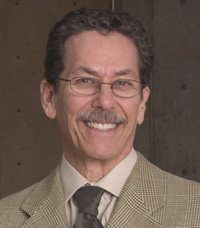Ronald M. Evans, an authority on hormones whose research on exercise and metabolism led to the discovery of compounds that act like "exercise in a pill" in lab tests, will deliver the 2010 Sinsheimer Lecture in Biology at UC Santa Cruz on Thursday, May 6.
Evans's talk, titled "Nuclear Receptors and AMPK: Resetting Physiology," will take place at 5 p.m. in the Music Recital Hall. The event is free and open to the public. Parking is available for $3 in the Performing Arts Lot.
Evans is a Howard Hughes Medical Institute investigator and professor and March of Dimes Chair in Molecular and Developmental Biology at the Salk Institute for Biological Studies. His lab is interested in understanding the molecular genetics of metabolic disease and inflammation, including atherosclerosis, diabetes, and cancer, and using this information to devise new treatments.
Early in his career, Evans isolated the gene for growth hormone, then set out to identify the molecular "switches" that turn it on. He and his colleagues discovered a large family of molecules, called nuclear receptors, that regulate the gene for growth hormone and other genes. A nuclear receptor works by binding to an activating molecule--a hormone or vitamin--and then moving into the nucleus of the cell where it tweaks the activity of its target gene.
Evans has found nearly 50 of these receptors, some of which play key roles in regulating the storage and burning of fat. Work with genetically engineered mice showed that permanently activating one of these switches, called PPAR delta, made mice resistant to weight gain, improved their response to insulin, and gave them super-endurance in treadmill tests. Further research identified a molecule called AMPK that interacts with PPAR delta and increases its activity.
In the ultimate couch potato experiment, Evans's team tested a drug known to activate AMPK to see if it could mimic the effects of exercise. After only four weeks, the treated mice got up and ran 44 percent longer than untreated, untrained mice. The discovery of this so-called "exercise in a pill" effect has important implications for treating diabetes, cardiovascular disease, muscular dystrophy, and frailty.
Evans has received many awards and honors for his work, including the 2004 Albert Lasker Award for Basic Medical Research, the Grande Médaille d'Or of the French Academy of Sciences, the 2006 Gairdner Award, and the 2007 Albany Prize in Medicine. He is a member of the National Academy of Sciences (NAS), the Institute of Medicine, the American Academy of Arts and Sciences, and the American Philosophical Society, and he was named the 1994 California Scientist of the Year.
The Sinsheimer Distinguished Lectureship in Biology is supported by an endowment from UCSC Chancellor Emeritus Robert L. Sinsheimer and his wife, Karen. Robert Sinsheimer, who was chancellor from 1977 to 1987, is a renowned molecular biologist and a member of the NAS, the Institute of Medicine, and the American Academy of Arts and Sciences. The lecture is hosted by UCSC's Department of Molecular, Cell, and Developmental Biology.
For more information and disability accommodation, call (831) 459-4986.



